Just In
- 9 hrs ago

- 12 hrs ago

- 12 hrs ago

- 16 hrs ago

Don't Miss
- Sports
 Pakistan vs New Zealand Live Streaming: PAK vs NZ Live Telecast in UK, USA and Canada
Pakistan vs New Zealand Live Streaming: PAK vs NZ Live Telecast in UK, USA and Canada - Movies
 Ranam OTT Release Date And Platform: When And Where To Watch Vaibhav Reddy Starrer Movie Online
Ranam OTT Release Date And Platform: When And Where To Watch Vaibhav Reddy Starrer Movie Online - Finance
 1:2 Stock Split: Record Date On April 24; Buy The Scrip Now To Be Eligible?
1:2 Stock Split: Record Date On April 24; Buy The Scrip Now To Be Eligible? - News
 Delhi Capital's Captain Rishabh Pant Gathers Praise For His Wicketkeeping Skills, Stunning Catch
Delhi Capital's Captain Rishabh Pant Gathers Praise For His Wicketkeeping Skills, Stunning Catch - Education
 SCCL Recruitment 2024; Application process, Selection criteria and more
SCCL Recruitment 2024; Application process, Selection criteria and more - Automobiles
 Mahindra 3XO SUV Latest Teaser Reveals Connected Car Tech: All Details Here
Mahindra 3XO SUV Latest Teaser Reveals Connected Car Tech: All Details Here - Technology
 OnePlus 13 Early Leak Hints at a Revamped Camera Island, and Fast Charging to Remain at 100W
OnePlus 13 Early Leak Hints at a Revamped Camera Island, and Fast Charging to Remain at 100W - Travel
 From Coconut Breaking on Head to Men Dressing as Women: 12 Unique Indian Rituals Explored
From Coconut Breaking on Head to Men Dressing as Women: 12 Unique Indian Rituals Explored
Is Thai Food Healthy? Everything You Need To Know About Popular Thai Ingredients
Trying cuisines from all over the world is indeed a delectable experience. From Mexican, Chinese to Thai, the options are plenty. Apart from the variety of flavours, some of these world cuisines are equally beneficial for your health.
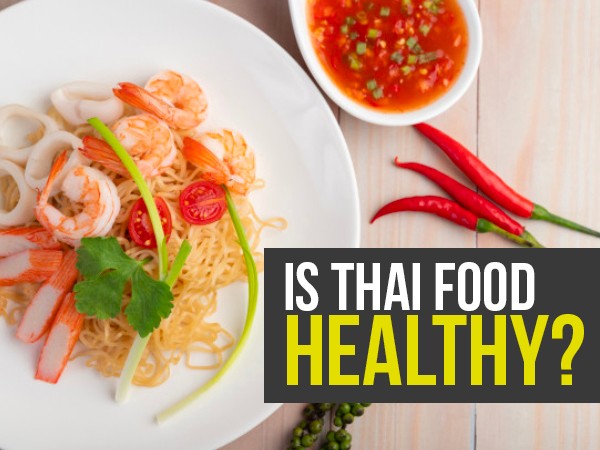
Today, we will explore the health benefits of Thai cuisine. You may be familiar with dishes such as Tom Yum Goong soup, Pad Thai or Satay, some of the common Thai foods which are widely popular not just due to the explosion of flavour but also for the health benefits Thai cuisine as a whole possesses.
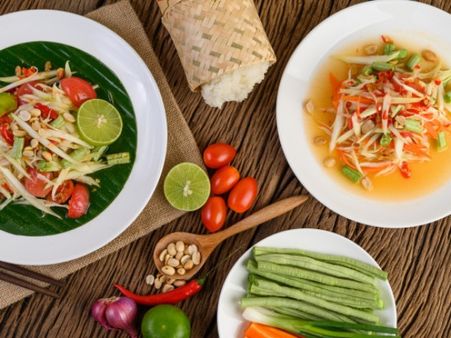
Thai Cuisine: A Traditional Combination Of Vegetables, Seafood And Spices
Thai cuisine is one of the healthiest foods you can eat, due to the use of fresh herbs and spices such as turmeric, galangal, coriander, basil, lemongrass, and fresh chillies that are good for one's overall health [1].

It is the ingredients used and the way of cooking, such as the utensils, that make Thai cuisine healthier than several other options. The combination of colourful vegetables, seafood, and meats, served with noodles or rice boasts impressive nutritional profiles [2].
The most commonly used veggies in Thai meals are non-starchy, such as peppers, tomato, cabbage, broccoli, carrots and onions which are loaded with fibre, vitamins, minerals, and a variety of compounds that contribute to proper digestion [3][4].
Some of the other common ingredients used in Thai cuisine are as follows:
- Tofu
- Lean meat
- Seafood
- Coconut milk
- Peanut sauces
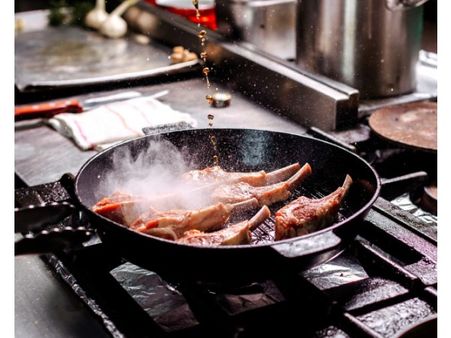
What Makes Thai Cuisine Healthy?
Cooking technique: Thai cuisine is cooked quickly on high heat, which helps retain most of the goodness of the ingredients. Also, Thai cooking makes use of very little oil, thereby reducing the risk of heart and other health problems [5].
The use of wok, a frying pan used in most Asian cooking, is proven to have numerous advantages over the standard frying pan. A wok distributes heat more evenly, requires less oil due to its high retention [6].
Low sugar and salt: Thai cuisine primarily uses natural sweeteners such as palm sugar, which has a lower GI than common refined sugars [7]. Also, Thai cuisine mostly avoids the use of common salt and the saltiness in food is usually acquired from adding fish sauce which is full of protein, vitamins and minerals [8].
Less hidden fats: Deep-fried foods and dairy products contain something called hidden fats such as the less healthy saturated fats present in whole milk and dairy products like cheese, cream and yoghurt. Foods like mayonnaise, fries, chips, chocolate, cookies, cakes etc. also contain hidden fats which can cause unhealthy weight [9][10]. Thai cuisine does not make much use of dairy products, so the dishes tend to include less hidden fats.
An abundance of vegetables: Most Thai curries contain fresh vegetables as the primary ingredient. A food that is mostly vegetables is easily a healthier option that one that has equal portions of meat and vegetables. Also, Thai foods feature a right balance of macronutrients, such as protein, fats, and carbs.
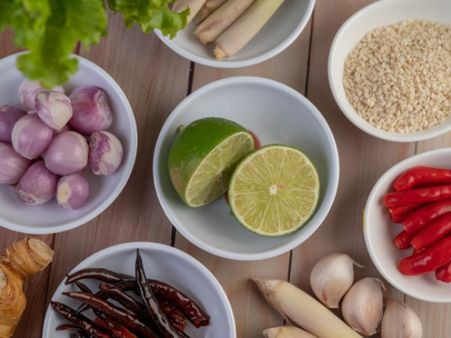
Common Thai Ingredients And Their Benefits
In addition to the style of cooking and controlled use of sugar and salt, the ingredients used in Thai cooking makes up for its plethora of health benefits. Here are the common spices and herbs used in Thai cuisine.
Turmeric: Turmeric contains anti-inflammatory, antiseptic, anti-fungal and antibacterial properties that can benefit your immune system in several ways. Turmeric's active component curcumin makes it a powerful antioxidant, which can help relieve allergy symptoms, protect the body from damage by toxins and free radicals, and also protects platelets in the blood, improving blood circulation [11].
Lemongrass: This lemony herb is a prominent ingredient in Thai cuisine. Lemongrass has been used in the treatment of flu and colds, fevers, headaches, abdominal pain, indigestion and fungal conditions [12].
Galangal (Thai ginger): Commonly used in Asian cooking for its digestive healing properties, galangal is dubbed as 'the spice of life'. A herb and a cure for a plethora of health conditions, galangal can be accorded as being equally beneficial in the culinary as well as the medicinal field [13].

...
Thai basil: Similar in taste to other basil varieties, Thai basil is used in curries, fried rice, and stir-fries. Studies say that this herb may help manage stress levels and blood sugar levels in diabetics [14].
Thai chilly: Thai cuisine makes use of fresh and dried chillies for a hot flavour. The capsaicin in these chillies may help promote fat-burning and decreases appetite [15].
Coriander: Thai cooking makes use of coriander seeds and leaves. These have been proven to help ease gastrointestinal trouble such as gas and bloating, digestive problems, infections and treat loss of appetite [16].
Tofu: Another common ingredient used in most Thai cuisine, tofu contains compounds called isoflavones that may help improve blood sugar control and reduce the risk of diabetes [17].
Coconut milk: Thai soups and curries are mostly made with coconut milk. While coconut milk contains fat, when consumed in limited quantities, it can help reduce bad cholesterol levels while promoting good cholesterol [18].
Some common healthy Thai dishes are spring rolls, papaya salad, Tom yum soup, steamed fish and vegetables, pad Thai and chicken larb.
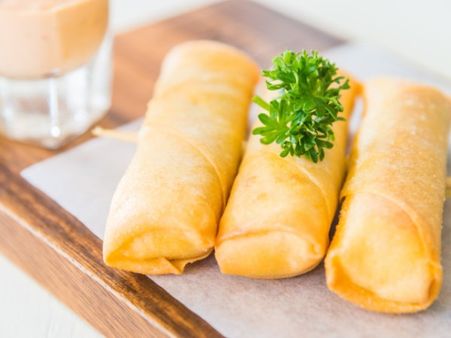
Thai Foods That You Should Limit/Avoid
While most of Thai cuisine is beneficial for your health, food from fast-food restaurants may not be the best way to try Thai foods as they can be deep-fried, served in large portions, or contain excessive amounts of added sugar and salt.
As Thai curries are mostly paired with rice or pad Thai, eating refined carbohydrates regularly may lead to weight gain and a higher risk of type 2 diabetes and other diseases. Some Thai foods contain added sugar such as Thai iced tea which is made with condensed milk and black tea [19].
Avoid or consume the following Thai foods in limited quantity as they are comparatively less healthy and may have high levels of sodium.
- Egg rolls
- Chicken wings
- Cheese wontons
- Fried pumpkin
- Fried tofu
- Thai iced tea
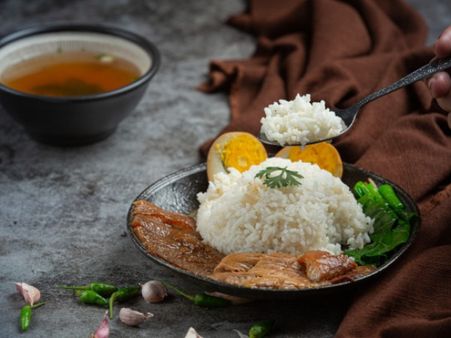
On A Final Note…
Although the Thai cuisine we get in the nearby restaurant may not be completely authentic, it will still have the healthy herbs and spices that are a boon to your immunity and digestion.
If you can find traditional Thai restaurants that serve authentic food, do not think twice about booking a table there and chose a plant-based dish, that has a variety of healthy herbs and spices, or choose one a dish that is protein-loaded.
-
 healthDo You Keep A Clove Of Garlic Under Pillow? Not To Keep Vampires At Bay, There May Be Scientific Reasons
healthDo You Keep A Clove Of Garlic Under Pillow? Not To Keep Vampires At Bay, There May Be Scientific Reasons -
 healthGet Your Groove On: 5 Health Benefits Of Dancing To Afro Beats
healthGet Your Groove On: 5 Health Benefits Of Dancing To Afro Beats -
 healthIndigenous Delicacies: 5 Rare Indian Wild Foods That Are So Healthy You Should Try It!
healthIndigenous Delicacies: 5 Rare Indian Wild Foods That Are So Healthy You Should Try It! -
 healthHaving Chicken Soup At Home Can Cure These Health Issues
healthHaving Chicken Soup At Home Can Cure These Health Issues -
 healthBoost Your Health with Beetroot: Health Benefits And Ways To Add The Colourful Veggie In Your Diet
healthBoost Your Health with Beetroot: Health Benefits And Ways To Add The Colourful Veggie In Your Diet -
 healthHealth Benefits Of Garam Masala: From Digestion To Weight Loss, Proper Use Can Yield Many Benefits
healthHealth Benefits Of Garam Masala: From Digestion To Weight Loss, Proper Use Can Yield Many Benefits -
 healthAyurvedic Wisdom: Panchamrit's Surprising Health Benefits
healthAyurvedic Wisdom: Panchamrit's Surprising Health Benefits -
 healthUnveiling the Power of Turmeric Ghee: An Ancient Ayurvedic Secret!
healthUnveiling the Power of Turmeric Ghee: An Ancient Ayurvedic Secret! -
 healthPlant-Based Diet And Nutrition: Your Key To A Stronger Immune System!
healthPlant-Based Diet And Nutrition: Your Key To A Stronger Immune System! -
 healthExperience the Healing Power of Indian Herbal Teas!
healthExperience the Healing Power of Indian Herbal Teas! -
 healthInternational Cat Day 2023: Did You Know That Cat Purring Can Benefit Your Health? Check Out How!
healthInternational Cat Day 2023: Did You Know That Cat Purring Can Benefit Your Health? Check Out How! -
 healthHeart-Healthy Breakfast: Discover The Benefits Of Frozen Strawberries
healthHeart-Healthy Breakfast: Discover The Benefits Of Frozen Strawberries


 Click it and Unblock the Notifications
Click it and Unblock the Notifications




